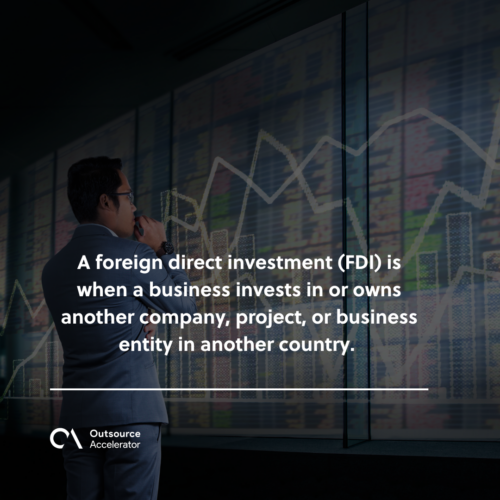Foreign direct investments (FDI)
Definition
What is the foreign direct investment?
A foreign direct investment (FDI) is when a business invests in or owns another company, project, or business entity in another country. The concept of direct control also distinguishes it from foreign portfolio investment.
FDI does not focus only on capital investment, it also includes the employment of management and infrastructure. In fact, many companies invest to acquire raw materials, expand the company’s territory, or establish an international presence.

Importance of foreign direct investment
For both governments and companies, FDI has become a foundation. For the government where a foreign direct investor enters, it aids them in improving the country’s employment and economic growth. But aside from these, here are the other advantages of FDI:
Technology transfer
Foreign direct investment is helpful for the transfer of technology that cannot be done by financial assets or trade-in products and services. FDIs serve as an avenue for emerging countries to acquire better technology infrastructure and more technical expertise to stay relevant in the global market.
Increase in competitiveness
FDI is also beneficial to boosting the competitiveness of the domestic market, enhancing the effectiveness of local industry, and decreasing prices.
Foreign direct investment can boost local market competitiveness. It may directly contribute to local businesses’ competitiveness by allowing them to penetrate worldwide manufacturing and marketing networks.
Economic progress
A look at emerging countries will show that opening up to FDI and new markets gives a strong boost to the economy. This may be in the form of new jobs, better infrastructure, and access to the global market.
Four types of foreign direct investment
The critical aspect of FDI is considered to be a long-term partnership. As a result, the investment is made to get a long-term stake and control in the economic entity and an implicit impact on the company’s management.
Horizontal, vertical, conglomerate, and platform foreign direct investments are the most prevalent FDI types.
Horizontal FDI
Horizontal FDI is the most frequent kind of FDI, and it involves investing cash in a foreign firm in the same industry as the FDI investor’s own or run business. In this case, a firm invests in a company located in a foreign nation and produces identical items.
A company expands its inland operations to another country using this FDI. The company operates in the same way but in a different country.
Vertical FDI
Another form of foreign direct investment is vertical FDI. A vertical FDI happens when a firm invests within a conventional supply chain, which may or may not be in the same sector.
When a company invests in a foreign firm that supplies or sells products, this is known as vertical FDI. There are two types of vertical FDI:
- Backward vertical integrations
- Forward vertical integrations
Companies that engage in vertical FDI usually want to decrease their raw material costs or acquire more control over their supply chain.
Conglomerate FDI
A conglomerate FDI is when a corporation or individual invests in a business outside of their own country that is unrelated to their present company.
A conglomerate is a vast business made up of numerous merged enterprises. In most situations, it provides a diverse range of goods and services that aren’t always connected.
Platform FDI
Platform FDI occurs when a company develops into a foreign nation yet exports the output of the overseas operations to a third country. This type of FDI is also known as export-platform FDI.
Platform FDI is most frequent in low-cost areas within free-trade zones.







 Independent
Independent




